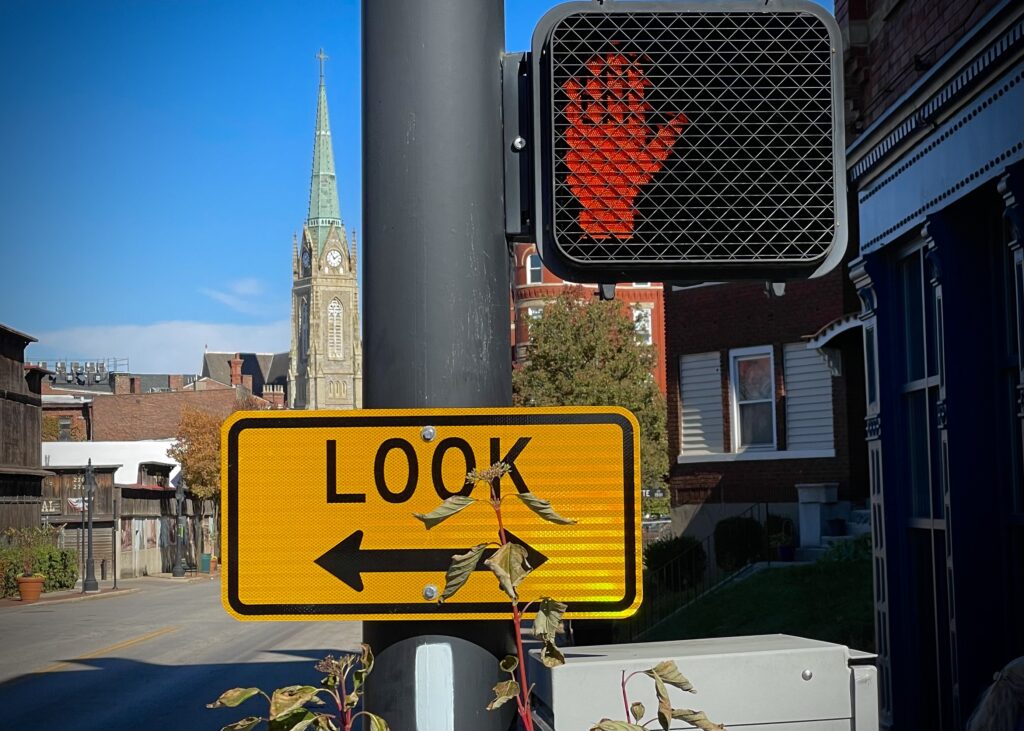Look both ways this Lent
Today we begin our annual Lenten journey. I hope you’ll find yourself in a church to hear the gospel, to receive the sacraments, and to be reminded of your mortality in the imposition of ashes. You’ll see me in church, because I certainly need all of the above.
Lent is a time for us to look carefully at our own lives. It’s tempting to look at everything except our own need to repent. Jesus says we need to stop and look…at our own hearts.

If you pray the daily office, you’ll encounter the assigned gospel for today, Luke 18:9-14.
Jesus also told this parable to some who trusted in themselves that they were righteous and regarded others with contempt: “Two men went up to the temple to pray, one a Pharisee and the other a tax collector. The Pharisee, standing by himself, was praying thus, ‘God, I thank you that I am not like other people: thieves, rogues, adulterers, or even like this tax collector. I fast twice a week; I give a tenth of all my income.’ But the tax collector, standing far off, would not even look up to heaven, but was beating his breast and saying, ‘God, be merciful to me, a sinner!’ I tell you, this man went down to his home justified rather than the other; for all who exalt themselves will be humbled, but all who humble themselves will be exalted.”
This parable is needed as much today as it was 2,000 years ago. As I have observed several times, I believe there is exactly one thing that all Christians have in common. Regardless of our nation, language, tribe, or creed, we all have this one universal behavior: we love to talk about other people’s sins.
In this parable, Jesus invites us to be different. It does us no good to judge others; Jesus says clearly that judgment is above our pay grade. On the other hand, it is good for us to look at our own hearts. And it does us lots of good to implore God’s mercy once we realize we have messed up and we are dependent on God. If a notorious sinner can be saved, by God’s mercy, then any sinner can be saved by God’s mercy.
If I want to know the abundant life that Jesus offers, it won’t happen if I only gaze at others so I can feel better about myself. The true joy of life in Christ begins when I look inward and pray for God’s mercy.
It’s not always easy to be honest with ourselves. But it’s essential. Because, you see, when we see our sins, we have already begun our journey toward new life. In Jesus’ parable, the tax collector realizes he’s messed up badly, and so he knows the first way to begin anew is to beg for God’s mercy. The Pharisee has not yet begun his own journey, because he has been focused on weighing the faults of others.
Today it’s easy for us to say, if those people were different, the world would be better off. And perhaps that’s true. While the Bible supports righteous anger at injustice, there’s little backing for merely condemning others and expecting them to do all the work. Instead, we do well to work out our own salvation with fear and trembling. Instead of wagging our finger at others, we can change the world one life at a time, by God’s grace beginning with our own lives.
This Lenten season invites us to gaze at our own hearts. See the sign in the photo on this post? It tells us we have to look both ways. So it is with our hearts. Looking one way, we should ask ourselves several questions. Where have we fallen short? Where have we squandered the gifts God has given us? Jesus stands ready to embrace us if we but turn to him. It’s just that simple. When we give up on the idea that we are our own saviors, we leave room for Jesus to be our savior.
On the other hand, we also need to look the other way. We might ask some other questions. Where have we found great joy in being a disciple of Jesus Christ? When have we made good use of the gifts that God has given us? How have we nurtured our journey as followers of Jesus? If we find places of joy and satisfaction, it isn’t spiritual bragging to share our insights and our peace in Christ. In fact, Jesus told us to let our light shine before others. So we might do our part to build up the body of Christ by sharing what has worked in our lives. Perhaps that will be just the thing a sibling in Christ needs to hear.
Over the next few weeks, we prepare ourselves for the radiant joy of Easter. The prayer book urges us to spend time with the scriptures, to pray, to fast, and to practice self-denial. Above all, the prayer book and 2,000 years of church tradition urge us to use this holy season of Lent to repent, to return to the Lord. To do that, we can start by looking both ways.
With courage, hope, and joy, let us celebrate the places God is at work in our own hearts and in our world. And let us with boldness acknowledge the ways we need to repent — and give thanks that we worship a God who always offers those with contrite hearts the fullness of grace and mercy.
Photo taken by yours truly on a recent dog walk in our neighborhood.